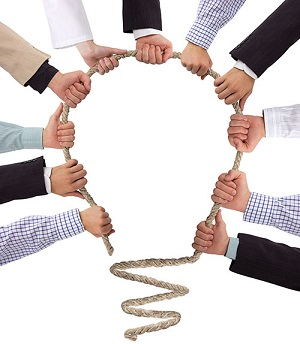ATD Blog
Discover the Collaboration Code for Innovation, Part 1
Tue Apr 28 2015

The IBM 2013 C-Suite Study discusses how some CEOs are using innovation to grow their businesses, with collaboration and technology acting as key enablers. However, for organizations to innovate successfully, they must develop a “mindset” that aligns with genuine collaboration—even before developing actual collaboration skills.
Mindset: A Foundation for Collaboration
The terms “team” and “teamwork” are used so frequently in our business culture that they’ve become clichés. Unfortunately, most organizations don’t function with a mindset that supports genuine collaborative teamwork. Instead, the typical mindset supports “group work,” which focuses more on cooperating and coordinating with others.
This disconnect reflects how metaphors have been used to reinforce individual performance and recognition over collective (team) performance and recognition. In their bestselling book, The Wisdom of Teams (HBR Press, 1992), Jon Katzenbach and Douglas Smith were two of the first thought leaders to talk about this conflict. “At their core, most people have values that favor individual responsibility and performance over any form of groups, whether it be a team or otherwise,” write Smith and Katzenbach.
The importance of mindset (underlying assumptions) in shaping values and behaviors cannot be underestimated. If the seminal book, Organizational Culture and Leadership (Jossey-Bass, 1986), Edgar Schein describes three levels that comprise organizational culture, with underlying assumptions (mindset) serving as the core to understanding and managing culture. In Schein’s highly credible model, underlying assumptions shape values and, eventually, influence behaviors.
Soccer: A Model of Collaboration
If leaders accept the notion that changing underlying assumptions to support collaboration is a key challenge to pursing innovation, “the (next) question becomes one of how to cultivate an alternative understanding (mindset) of teamwork such that collaboration becomes more realistic or at least more realizable,” contends Danah Zohar in An Alternative Sports Metaphor for Understanding Teamwork as Complex: Soccer. “And alternative mindsets aren’t simply inserted as new software – they must be learned,” she adds.
In The Collaborator: Discover Soccer as a Metaphor for Global Business Leadership, I described 11 operating principles (“or operating assumptions”), along with a series of competencies and behaviors, to describe how organizations can cultivate an alternative understanding of collaborative teamwork—by introducing soccer’s metaphor in the form of an operating platform. When applied, the principles unlock the “collaboration-code” for managing globally.
The Center for Creative Leadership (CCL) explain in the report Future Trends in Leadership Development that, “researchers (over the past 10 years) have shown that innovation is a result of large numbers of connection points in a network that cause existing ideas to be combined in new ways.” The report goes on to state that, “innovation doesn’t emanate from individual people; it lives in the social network.”
With that being said, the game of soccer provides a viable option for understanding genuine collaborative teamwork. In soccer, for example, a large (if not infinite)number of connection points are created in a network (consisting of 11 players on the field) that operate in a dynamic fashion under constantly changing conditions. Moving the ball down the field equates to causing existing ideas (plays) to be combined in new ways for the purpose of scoring a goal—or innovating!
You've Reached ATD Member-only Content
Become an ATD member to continue
Already a member?Sign In
